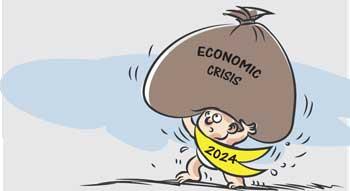Reply To:
Name - Reply Comment
 In spite of various leaders of the government painting a rosy picture about the recovery of the economy from the current crisis and the innocent hopes of the people of the country that the humble normalcy in their life would return very soon, the Department of Census and Statistics had shown last week a bleak picture of the country at present and in the future.
In spite of various leaders of the government painting a rosy picture about the recovery of the economy from the current crisis and the innocent hopes of the people of the country that the humble normalcy in their life would return very soon, the Department of Census and Statistics had shown last week a bleak picture of the country at present and in the future.
The Department had shown the real side of the lives of the people which has been concealed in a false esteem maintained by each individual in society, while the politicians are vying to win over them in the New Year, keeping in mind the approaching national level elections, especially the Presidential Election that has to be conducted in September or October this year.
In a summary of the findings of a survey, the Department had stated that the economic crisis - the origin of which it had traced back to the 2019 Easter Sunday terrorist attacks - is bearing on the people with as many as 60.5 percent of households finding their monthly average income reduced, while 91 percent of households experience an increase in their monthly expenditure levels.
Although this fact is true in respect of the high income segment of the society as well (which is normally least price sensitive), their luxurious life style is not disturbed; they spend millions on food and in night clubs, live in mansions, use billions worth vehicles and often travel overseas, sometimes for business purposes, sometimes seeking fun with their families and at times for medical treatment. It is the low income group that bears the brunt of the crisis.
The survey conducted by the Census Department says (apparently the low income) households not only adjusted their food consumption habits but also employed diverse livelihood based coping strategies to address the challenges of inadequate food access and availability. It must be recalled that UNICEF Regional Director for South Asia, George Laryea-Adjei said in a statement in August 2022 that in Sri Lanka “families are skipping regular meals as staple foods become unaffordable. Children are going to bed hungry, unsure of where their next meal will come from.” Also, President Ranil Wickremesinghe told Parliament in June 2022 as the then Prime Minister that a study by the World Food Program (WFP) had found that 73 percent of the participating households had reduced their diet and food intake. That means the situation which has been prevailing over the years has exacerbated in the recent past.
While many people are preparing for celebrations of the New Year over the weekend, millions of people are taking pains to make up their minds on coping with the new Value Added Tax (VAT) increase which would result in the hike of prices of a plethora of goods and services apart from the woes that they are already undergoing.
An ordinary family which is drawing a monthly income of about Rs. 40,000 is already paying nearly Rs. 20,000 for all their utility bills while paying about another Rs. 8,000 for a child’s school van fees (if there is only one school going child in the family), for transportation from a village or a suburb to a school in the city. These and all others including the expenses for essentials such as food items are to be hiked again with the implementation of the new VAT regime. Imagine the pressure on the parents of such families now, since there is a limit for coping strategies.
And already those strategies have started to have their bearing on the health, education and social status of families at various levels. The frustration might ultimately explode at both individual as well as social level, meaning individuals might seek a way out through thefts, drug peddling and various other crimes which have already increased, while there might be a point where social unrest would break out despite crackdowns of whatever magnitude. To simply put it, we are on top of a volcano.
Authorities must pre-empt this looming social unrest with prudent economic management and not with repressive laws, as it would further destroy the economy and political stability, leaving the country with no option except anarchy.